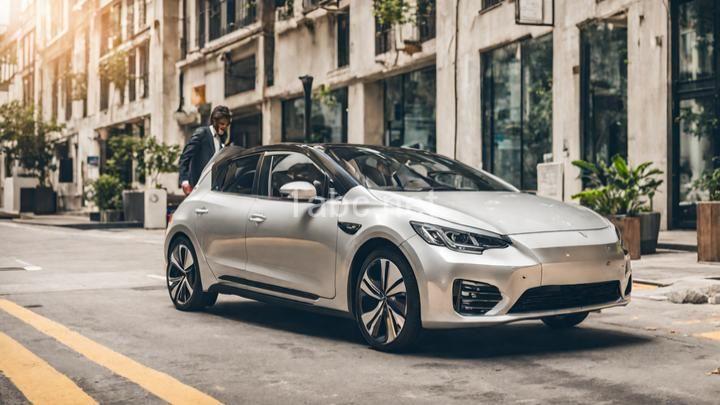The Future of Fuel Efficiency: Exploring the Latest Car Rental Technologies
Introduction:
I. Understanding Fuel Efficiency:
II. Traditional Approaches to Fuel Efficiency:
III. The Latest Car Rental Technologies:
1. Electric Vehicles (EVs):
2. Hybrid Vehicles:
3. Alternative Fuels:
4. Smart Car Features:
IV. Benefits for Consumers:
V. Challenges and Considerations:
VI. The Future Outlook:
Conclusion:

Introduction:
Hey there, fuel-conscious friends! Welcome to another exciting blog post where we dive deep into the world of fuel efficiency in car rentals. We know that finding an eco-friendly vehicle can be a challenge, but fear not! We're here to guide you through the latest technologies and innovations that are revolutionizing the car rental industry. So buckle up and let's explore the future of fuel efficiency together!
I. Understanding Fuel Efficiency:
Before we jump into the exciting world of cutting-edge technologies, let's first understand what fuel efficiency really means when it comes to cars. In simple terms, fuel efficiency refers to the ability of a vehicle to maximize the energy it gets from its fuel source. In other words, it's all about getting the most bang for your buck at the gas pump.
The benefits of fuel-efficient vehicles are two-fold. First, they can save you a ton of money on fuel costs in the long run. Just imagine being able to drive those extra miles without constantly worrying about the next gas station. Second, fuel-efficient cars contribute to a greener and healthier environment by reducing carbon emissions. It's a win-win situation for both your wallet and the planet!
II. Traditional Approaches to Fuel Efficiency:
Now that we have a good grasp of what fuel efficiency entails, let's take a look at some of the conventional methods that car rental companies have been using to improve efficiency. These methods include engine optimization and aerodynamic design.
Engine optimization involves tweaking the internal components of the engine to maximize its efficiency. This can be achieved through enhancements such as better fuel injection systems, improved combustion processes, and advanced engine management systems. On the other hand, aerodynamic design focuses on reducing drag and optimizing airflow around the vehicle. This can be achieved by streamlining the car's shape and adding features like underbody panels and spoilers.
While these traditional approaches have certainly made strides in improving fuel efficiency, they do have their limitations. Engine optimization can only go so far and aerodynamic design changes may not always be practical for rental fleets. This is where the latest car rental technologies come into play!
III. The Latest Car Rental Technologies:
Hold on tight, because we're about to dive into the exciting world of cutting-edge car rental technologies that are taking fuel efficiency to the next level!
1. Electric Vehicles (EVs):
Electric vehicles, or EVs, have been making waves in the automotive industry. These vehicles are powered by electricity stored in rechargeable batteries, eliminating the need for gasoline or diesel. Not only do EVs produce zero tailpipe emissions, but they also offer superior energy efficiency compared to traditional combustion engines. Imagine never having to visit a gas station again!
2. Hybrid Vehicles:
Hybrid vehicles combine the best of both worlds by utilizing both electric and gasoline power sources. These vehicles feature an electric motor that assists the gasoline engine, resulting in improved fuel economy. The electric motor also allows for regenerative braking, where energy is captured and stored in the battery during braking or deceleration. This stored energy can then be used to power the vehicle at low speeds or during acceleration, further improving fuel efficiency.
3. Alternative Fuels:
In addition to EVs and hybrid vehicles, alternative fuels are gaining traction as sustainable alternatives to gasoline or diesel. Biofuels, derived from renewable sources such as corn or sugarcane, offer a cleaner burning option that reduces greenhouse gas emissions. Hydrogen fuel cells, which convert hydrogen gas into electricity, are another promising alternative. And let's not forget about compressed natural gas (CNG), which burns cleaner than traditional fossil fuels.
4. Smart Car Features:
Smart car features are another exciting development in the world of fuel efficiency. These features use advanced technologies to optimize fuel consumption. For example, automatic start-stop systems shut off the engine when the vehicle is idle, such as at a stoplight, and then restart it when you release the brake. Regenerative braking recovers energy that is typically lost as heat during braking and converts it into usable electricity. And eco-driving assistance systems provide real-time feedback on driving habits, helping drivers adopt fuel-saving techniques like smooth acceleration and deceleration.
IV. Benefits for Consumers:
Now that we've covered the latest fuel-efficient technologies, let's talk about the benefits that consumers can expect when renting these eco-friendly vehicles. First and foremost, renting a fuel-efficient car can save you a significant amount of money at the pump. With rising fuel prices, this can make a noticeable difference in your travel budget.
But the perks don't stop there! Many car rental companies are now offering additional incentives to customers who choose fuel-efficient options. These incentives can include discounted rental rates, free upgrades, or even loyalty program rewards. So not only do you get to save money on fuel, but you also get to enjoy extra perks along the way. Talk about a win-win situation!
V. Challenges and Considerations:
While the future of fuel efficiency in car rentals looks bright, it's important to address some of the challenges and considerations that come with adopting these new technologies.
One of the main challenges is the limited infrastructure for charging electric vehicles. While the number of charging stations is growing, it may still be a concern, especially if you're planning a road trip in remote areas. Additionally, sourcing alternative fuels like biofuels or CNG may not be as readily available as gasoline or diesel in some regions.
To overcome these challenges, it's essential to plan ahead and research the availability of charging stations or alternative fuel sources in your desired rental location. Car rental companies are also making efforts to expand their charging infrastructure, so it's worth checking if they offer charging options or partnerships with charging networks.
VI. The Future Outlook:
Now that we've explored the latest technologies and discussed the challenges, let's take a moment to look ahead at the future of fuel efficiency in car rentals. The possibilities are endless!
Ongoing research and development efforts are focused on improving battery technology for EVs, allowing for longer driving ranges and faster charging times. The expansion of charging infrastructure will continue to make EVs a more viable option for long-distance travel. And as renewable energy sources become more prevalent, the production of alternative fuels will become more sustainable and accessible.
In the coming years, we can expect to see even more advancements in fuel efficiency, with car rental companies leading the charge towards a greener and more sustainable future. So the next time you're in need of a rental car, consider choosing a fuel-efficient option and be a part of the movement towards a cleaner planet!
Conclusion:
Congratulations, fuel efficiency advocates! You've made it to the end of our exciting journey through the world of fuel efficiency in car rentals. We hope this blog post has shed some light on the latest technologies and innovations that are shaping the future of the industry.
Remember, renting a fuel-efficient vehicle not only saves you money but also contributes to a healthier planet. So the next time you're planning a road trip or simply need a car for a few days, take a moment to consider the fuel-efficient options available to you. Your wallet and the environment will thank you!
Thank you for joining us on this fuel-efficient adventure. We hope you found this blog post informative and inspiring. If you're hungry for more knowledge, be sure to check out our other articles and resources on our website. Until next time, happy and eco-friendly travels!
FREQUENTLY ASKED QUESTIONS
What is The Future of Fuel Efficiency: Exploring the Latest Car Rental Technologies?
The future of fuel efficiency in car rental technologies looks promising as advancements continue to be made. With increasing environmental concerns and the need for cost-effective transportation, car rental companies are focusing on implementing innovative solutions to improve fuel efficiency.One of the latest technologies that hold great potential is electric vehicles (EVs). EVs are powered by electricity, which reduces or eliminates the need for fossil fuels. As the infrastructure for charging stations improves, EVs are becoming a more viable option for car rentals. Not only do they have zero emissions, but they also offer a smooth and quiet driving experience.
Another technology that is gaining traction is hybrid vehicles. These vehicles combine an internal combustion engine with an electric motor, resulting in improved fuel economy. Hybrids are particularly useful for city driving, where frequent stops and starts can benefit from the electric motor's efficiency.
Car rental companies are also exploring the use of alternative fuels such as hydrogen and biofuels. Hydrogen-powered vehicles produce only water vapor as a byproduct, making them a clean option. Biofuels, derived from renewable sources such as plant materials, can help reduce greenhouse gas emissions.
Car rental companies are investing in advanced telematics systems to monitor and optimize fuel efficiency. These systems collect data on driving behavior, route optimization, and vehicle diagnostics to provide feedback and suggestions for more efficient driving.
Additionally, car rental companies are incorporating aerodynamic designs and lightweight materials in their vehicles. These measures reduce drag and weight, resulting in improved fuel efficiency.
The future of fuel efficiency in car rental technologies is not limited to one specific solution. Instead, it involves a combination of various technologies and strategies to maximize efficiency and minimize environmental impact. As technology continues to evolve, we can expect more innovative solutions to emerge, making car rentals a greener and more sustainable option for transportation.
Why is fuel efficiency important in car rentals?
Fuel efficiency is crucial in car rentals for several reasons. Firstly, it helps to reduce the overall cost of renting a car. When a vehicle is fuel-efficient, it consumes less fuel, resulting in lower expenses for both the rental company and the customer. This can be especially beneficial for customers who are on a budget or looking to save money on their transportation expenses.Secondly, fuel efficiency is environmentally friendly. By choosing a fuel-efficient rental car, customers can contribute to reducing carbon emissions and help mitigate the negative impact on the environment. This is particularly important in today's world, where sustainability and environmental consciousness are becoming increasingly significant.
Furthermore, fuel efficiency also affects the overall driving experience. A car that is fuel-efficient generally has better engine performance, smoother acceleration, and a quieter ride. This can enhance the comfort and satisfaction of the customer during their rental period.
Lastly, from a practical standpoint, a fuel-efficient rental car allows customers to travel longer distances without the need for frequent refueling stops. This can be particularly advantageous for road trips or when exploring new places, as it reduces the hassle and time spent on finding gas stations.
In conclusion, fuel efficiency plays a vital role in car rentals due to its cost-saving benefits, environmental impact, improved driving experience, and practicality. By prioritizing fuel efficiency, both rental companies and customers can enjoy a more economical and sustainable transportation option.
What are some of the latest technologies discussed in the content?
In the content, some of the latest technologies that are discussed include artificial intelligence (AI), virtual reality (VR), blockchain, and Internet of Things (IoT). These technologies have been making significant advancements and are transforming various industries. AI enables machines to perform tasks that typically require human intelligence, while VR immerses users in a virtual environment. Blockchain technology ensures secure and transparent transactions, and IoT connects everyday objects to the internet, enabling them to collect and exchange data. These technologies are shaping the future and have the potential to revolutionize how we live and work.
How can hybrid and electric vehicles help with fuel efficiency?
Hybrid and electric vehicles are designed to improve fuel efficiency in several ways. Firstly, they utilize a combination of an internal combustion engine and an electric motor. This combination allows the vehicle to consume less fuel compared to conventional vehicles as the electric motor assists in powering the vehicle, reducing the overall reliance on the gasoline engine.Additionally, hybrid vehicles employ a technology called regenerative braking. This system captures and stores energy that is normally lost during braking. The stored energy is then used to power the vehicle, reducing the need for the engine to consume additional fuel.
Furthermore, electric vehicles (EVs) do not rely on gasoline at all. Instead, they run solely on electricity stored in a battery. EVs have the advantage of being able to charge their batteries using renewable energy sources, such as solar or wind power. This not only helps reduce fuel consumption but also decreases greenhouse gas emissions.
Hybrid and electric vehicles also benefit from improved aerodynamics and lighter materials, which contribute to their fuel efficiency. The streamlined designs and reduced weight result in less drag and energy required to move the vehicle.
Overall, hybrid and electric vehicles play a crucial role in enhancing fuel efficiency by utilizing a combination of electric power, regenerative braking, renewable energy sources, and advanced technologies. Their innovative features make them an eco-friendly alternative to traditional gas-powered vehicles.




